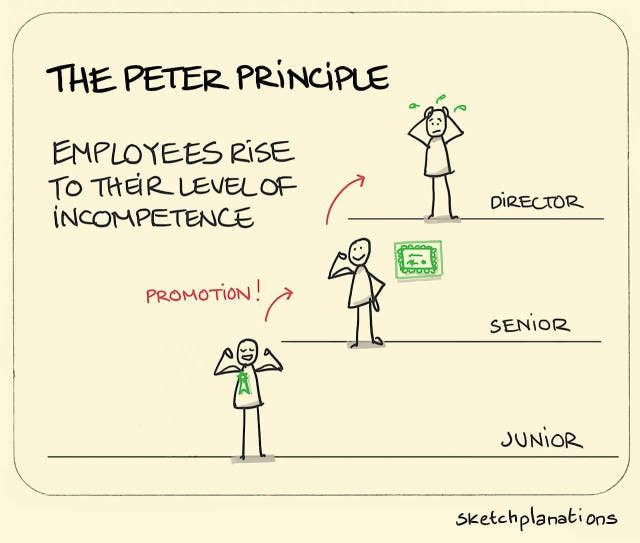The Peter principle is a theory that states that people are promoted to their level of incompetence. In other words, people are promoted because they’re doing a good job, but they aren’t given any more training or education so they continue to do a good job but they’re not really qualified or suited for the job they are now doing. This is often the case with managers. Because they’ve met the expectations of their superiors, they are often promoted and given even more responsibilities.
The Peter Principle is a colloquialism used to explain a tendency in organizations for employees to be promoted to a higher position than their capability. The principle is named after the original colloquialism in which a man named “Mr. Peter” was promoted to a higher position than his capability, and continued to be promoted until he was in the highest position in the company. It is most commonly used to describe a situation where an employee is promoted to a position that requires different skills than what they have been performing in their current position.
Related: Peter Principle: What You Need to Know
The Peter principle is a theory that states that people will tend to be promoted until they reach their maximum level of incompetence. In other words, people will keep getting promoted until they reach a level where they can’t do their job, regardless of whether they are good at their current job. The theory is named after the German psychologist and philosopher Dr. Laurence J. Peter who developed the theory in the 1970s.
Advertisment
Dr Peter observed that in hierarchies such as the military, it was often the case that regardless of how well a person performed their job, they would keep getting promoted until they became a general. This happened because the military required a lot of training and experience, so when people were promoted to positions in the military, they naturally looked like good candidates for promotion. But because they were promoted to a position that required different skills than what they were doing in their current position, they were unable to perform in their new position. They were in a position of maximum incompetence.
The Peter Principle is the observation that people tend to be promoted to their level of incompetence. In other words, people tend to be promoted to positions that require skills and experience they don’t have. This happens because current positions have a lot of responsibilities and require a lot of skills and experience so that when people are in those positions, they look like good candidates for promotion. But because they don’t have the necessary skills and experience, they fail when they’re in new positions.
The peter principle states that people will tend to be promoted until they reach their maximum level of incompetence. In other words, people will keep getting promoted until they reach a level where they can’t do their job, regardless of whether they are good at their current job. The theory is named after the German psychologist and philosopher Dr. Laurence J. Peter who developed the theory in the 1970s.
Related: The Peter Principle and why it Matters to every organisation
The Peter principle, as a theory, is a very valuable one. The peter principle is an insight that provides us with an explanation for why people keep getting promoted, even though they are not doing well, and it helps us understand why some people rise to the top of their organizations and others do not. The peter principle can also affect the way people behave on the job. It’s not just the case that the best people will keep getting promoted and the worst people won’t. The best can also fail. As you might guess, this can have severe consequences for your work performance.
The reason why incompetent managers get promoted is that they are good candidates for promotion.
A study by Daniel Pink has provided a lot of evidence that people who are promoted to positions that require a different set of skills have performed poorly. The study found that the worst managers are promoted to positions different from their current job, and the best managers are promoted to new positions similar to their current job. They found that the best managers are promoted to positions that require skills that they already possess, which leads to better performance.
Incompetent managers often keep getting promoted because their competency is masked by their incompetence. This is what the peter principle is all about. When someone is incompetent, the people around them will often take the credit for their work. They will try to keep the incompetent manager promoted, even though their incompetence is often obvious to everyone.
Memory Nguwi is an Occupational Psychologist, Data Scientist, Speaker, & Managing Consultant- Industrial Psychology Consultants (Pvt) Ltd, a management and human resources consulting firm.
Email:mnguwi@ipcconsultants.com or visit our websites https://www.thehumancapitalhub.com/ and www.ipcconsultants.com
